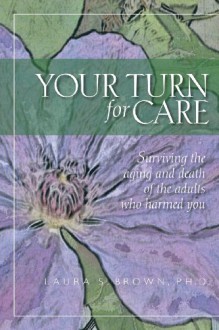
This is a book about relating to elders, caregiving, and death for people whose personal childhood story was a horror movie, not a Hallmark card.
For those adults who are pursuing relationships with and/or becoming caregivers to elders who were reasonably loving, decent, and honorable in their relationships with you, those complications are difficult in and of themselves...
There is a group of adults whose dilemmas in dealing with the aging, illness, and death of elders are complex beyond the norm. This book is for those folks—for adults raised in families that were frightening, confusing, dangerous, sometimes criminal in their treatment of their children. The elders in these families are...people who...behaved in vicious, venal, abusive, and/or neglectful ways to those children. You are those children, grown into adults confronted with cultural and social demands to relate to those elders, and sometimes to step into the caregiver role.
This is an almost one-of-a-kind resource, since nobody seems to have put together two clear facts: a huge number of children are abused in childhood, and [in the US] a full 60% of elderly people are being cared for solely by family. That number increases to 95% if we include family taking any role in caregiving for a family member. So it is clear that many people who were abused in childhood are now caring for that abusive parent/primary caregiver in their elderly years.
Surprisingly, there was nothing in the self-help literature (and there seems to be little or no scholarly research finished or even in process) for those adult children who are now either feeling pressured to care for their former abusive caregiver or who are already doing so.
Obviously this can be problematic on a number of levels.
I'm only writing this review so others will know of this resource. Written in a very open and non-prescriptive style, readers can take what they need and ignore the rest. For those who want much clearer "do this" and "don't do that" guidance, this may feel somewhat nebulous. The bottom line comes down to "you do not have to care for this person who harmed you when you were the vulnerable one."
There is tremendous personal and societal pressure to take on the role of caregiver to an elderly person, but that may be a very bad idea for a number of reasons -- both to the adult child and to the formerly abusive older person. (And not every abusive person becomes lovely and kind in old age. They may continue some abusive patterns throughout life.)
Unfortunately, the US medical system doesn't much care if this person terrorized you, they will assume you either should or must take on this new project. Armed at least with one resource, hopefully we can avoid everyone feeling like they must be the primary caregiver to the person who failed so horribly in this role years before.

 Log in with Facebook
Log in with Facebook 






